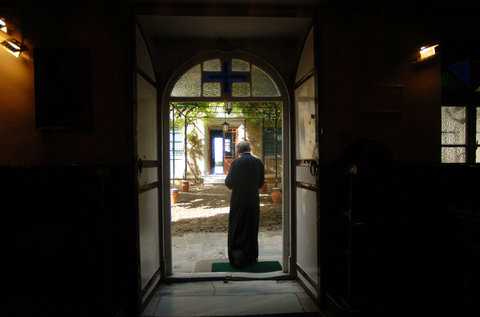
Lynsey Addario for The New York Times
The Greek Orthodox Halki Seminary on the island of Heybeliada on the Marmara Sea near Istanbul.
ISTANBUL — The Princes’ Islands are a chain of volcanic droplets off the coast of Istanbul, famous for their grand Palladian-style wooden summer homes and sweet-smelling pine woods. From one of the hilltops of the second-largest, Heybeliada, “the saddle-bagged” island, the view across the water is of a metropolis in motion, growing higher and wider, eating into more and more green space every year. But on Heybeliada itself, the only distractions are the squawk of seagulls and the clip-clop of horse-drawn carriages (no cars allowed). There, it is easy to imagine that time has stood still.
In a way, history has indeed been frozen on Heybeliada since 1971. This was the year when the Turkish government imposed a form of martial law and shut down educational institutions not under state control. The hilltop seminary, the Holy Theological School of Halki, which had since the mid-19th century trained generation after generation of Greek Orthodox priests, was closed. Later, some of its land was confiscated.
The rest of Turkey has changed a lot in the intervening years. In 1999, twin earthquakes on either side of the Aegean Sea produced a rapprochement between Turks and Greeks, and much longstanding bitterness — the result of earlier conflicts in the Aegean and in Cyprus — dissipated.
Turkey no longer argues that it should limit the rights of Turkish citizens who are Greek Orthodox, tit-for-tat, because the Greek government does the same. In any event, Athens has ceded far more rights to the Turkish Muslims of Thrace, lifting restrictions on the sale and repair of property.
But the Halki seminary remains closed.
Meanwhile, the die-hard, anti-Greek stance of Turkish officialdom has softened. Turkish courts have started returning land that had been seized — illegally, they say — from non-Muslim religious foundations, including land around the Halki seminary and the Greek Orthodox orphanage on the hilltop of the next island.
The Turkish government itself seems eager to improve relations with the 3,000 Greek Orthodox and other non-Muslims who live in Turkey and their powerful lobbyists abroad. The Turkish foreign minister and minister of education say that Halki should reopen; the United States and the European Commission regularly push for the same.
And yet the Halki seminary remains closed.
Why? I think the explanation has nothing to do with vestigial resentment between Turks and Greeks and everything to do with the government’s care not to alienate mainstream Islam.
The problem with reopening the Halki seminary is that if Greek Orthodox priests are allowed to be trained there again, in an institution outside the state’s control, the Turkish government could come under pressure to extend that right to Muslims.
The current government very much represents the Sunni mainstream. Last week Prime Minister Recep Tayyip Erdogan insisted that the halls where Alevis — Turkey’s Shiites and 15 percent of the population — congregate are mere cultural centers, not places of worship.
The implication is that real Muslims pray in mosques and under the government’s watchful eyes, like those of the powerful and well-funded Presidency of Religious Affairs, which licenses after-school Koranic courses, administers Turkey’s quota for sending pilgrims on the hajj and pays the clerics who prepare the weekly sermon.
Turkey, formally a secular democracy, may want to become more liberal toward its religious minorities, but not at the risk of tolerating more diversity within the Muslim mainstream.
And so the Halki seminary remains closed.
Andrew Finkel has been a foreign correspondent in Istanbul for over 20 years, as well as a columnist for Turkish-language newspapers. He is the author of the book “Turkey: What Everyone Needs to Know.”
via Turkey May Be More Tolerant of Some Non-Muslim Minorities Than Muslim Minorities – NYTimes.com.